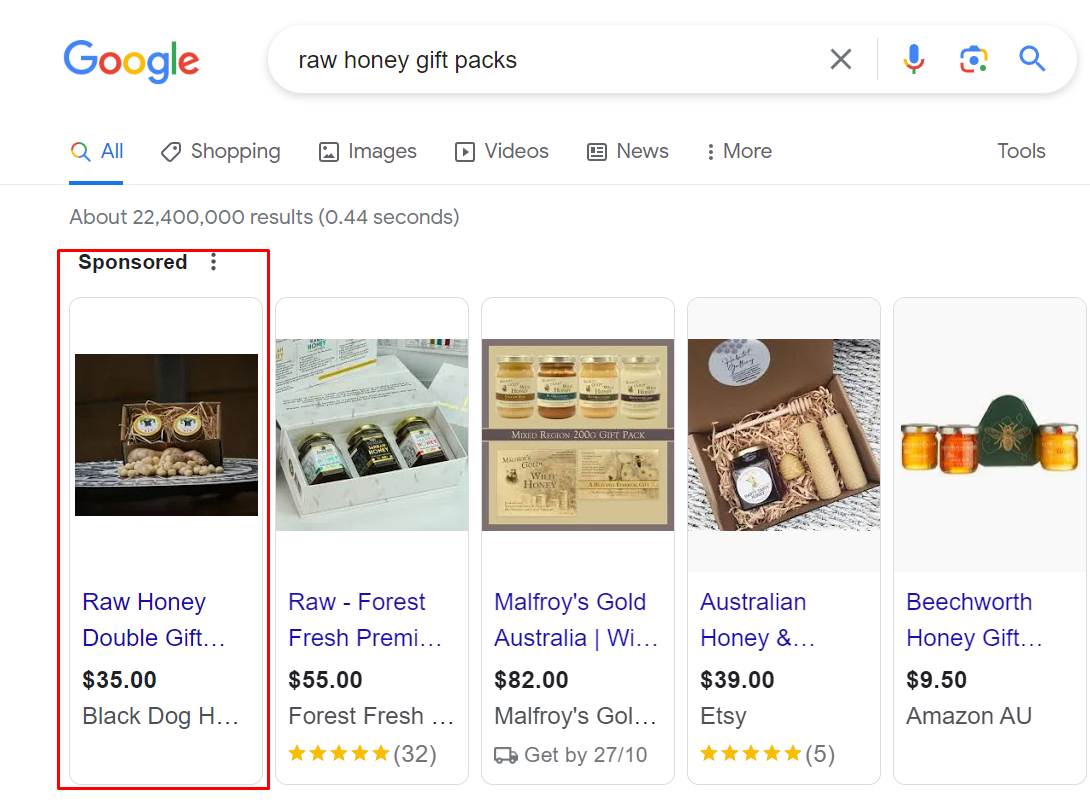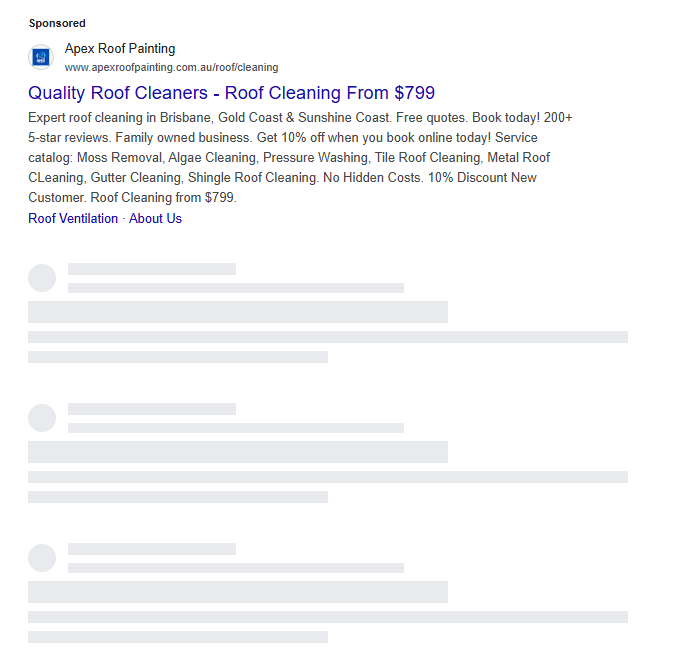Google Ads Agency Australia
Run highly effective paid search, shopping and display campaigns and acquire new customers
We put your paid Google Ads at the top of search results
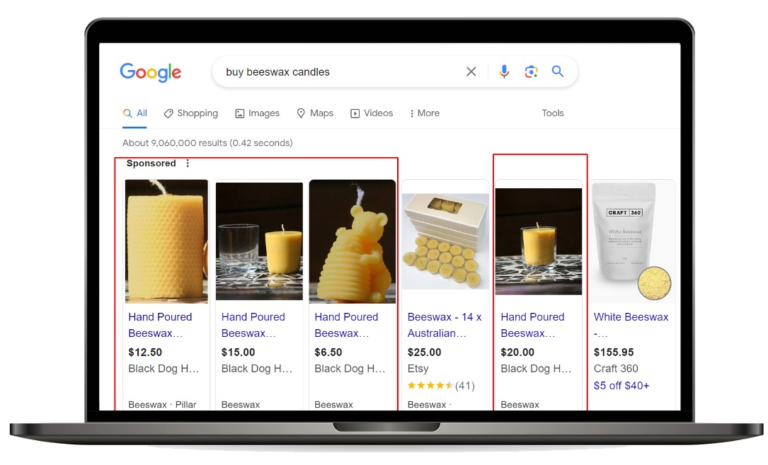
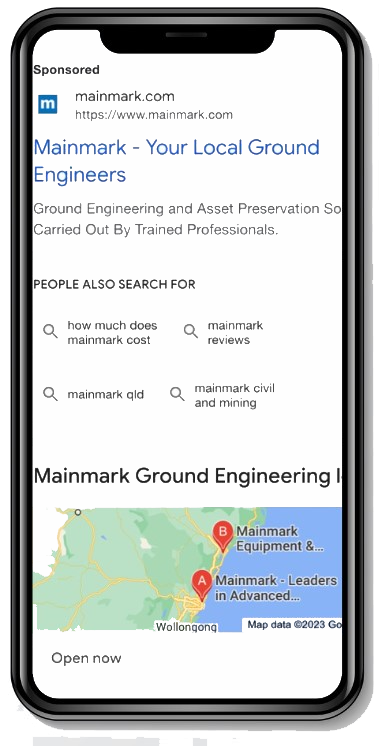
Our structured approach creates highly effective Google Ads campaigns
Consultation and discovery session
Our consultation and discovery session is crafted to serve as your guide, in the realm of Google Ads.
We firmly believe that comprehending your business objectives, intended audience and industry specific nuances is crucial for a campaign. Our team of marketing professionals will collaborate closely with you to uncover valuable insights and devise a customised strategy for Google Ads.
Keyword research
and account setup
We undertake a detailed approach to discover the relevant and effective keywords for your specific industry and target audience. Our main objective is to ensure that your advertisements are displayed to the individuals at the right moments.
In addition, to conducting keyword research we meticulously. structure your Google Ads account in order to track conversions, target specific locations and create effective remarketing audiences that can be used to drive sales and appointments..
o
Ad copy creation
Creating eye catching ad copy is both an art and a science Our team of exceptional copywriters will create ads that grabs your audiences attention and also compels them to take action. We recognise the influence of language.
We will work closely with you to effectively communicate your value proposition and key selling points. Whether you require search ads that appear on Google’s results pages or visually appealing display ads, we have you needs covered.
Test, learn and optimise
We strongly believe that the key, to an advertising campaign goes beyond launching it and letting it run. Our approach centres around a cycle of refining and enhancing the campaign. We conduct testing and learn from the results, making improvements along the way.
We closely monitor data identifying trends and insights that drive our optimisation process. This systematic method ensures your Google Ads campaign consistently performs its best.
Ready to grow your business?
Book your free discovery session today and discuss how we can help improve your Google Ads campaign
Google Ads for eCommerce Businesses
Google’s shopping network ads are the most powerful advertising methods for eCommerce brands.
Low cost-per-click and high customer intent leads to massive returns for eCommerce brands.
We can help set up your Merchant Center account, sync your product feed and run your Google Shopping Ads.
Google Ads for Trades and Services
Whether you’re a plumber, handyman, builder or technical engineering firm we can get you ranked on the first page of Google.
Working closely with our client Mainmark, we successfully rebuilt their website, optimised and ranked them on the first page of Google for high value keywords
As of today, they now rank #1 for competitive keywords in their industry and drive thousands of qualified visits to their website each month
Download our complete guide to running Google Ads yourself
Download our comprehensive training guide on how to setup and run your own Google Ads campaign.
People think we are crazy by giving this stuff away for free, but that’s one of our core values. We provide advice and help completely free.
Don’t have the time to do it yourself? Give us a call and we can help you with one of our affordable packages below.
What clients say about us
“Cameron and his team managed our Google Ads and has been nothing short of exceptional. The expertise and guidance provided generated an increase of 350% in qualified leads and significantly amplified our online presence and delivered valuable traffic to our website.”
Tanya ManyanHead of Marketing, PICA Group

“Cameron built the Mainmark website for us, which saw a massive improvement in performance and made it much easier for us to manage our content. This marketing enablement helped improve our SEO and generated more leads for our business. I highly recommend him and his team”
Sanjay VivekanadaDigital Marketing Manager, Mainmark

Cameron did a superlative job with us. He was always responsive and also showed great initiative in coming up with suggestions that would assist in our Digital Marketing & Social Media strategy.
The program would not have been as successful as it was without his input, commitment and enthusiasm.
Bernie BirchGeneral Manager, Freelife

Cameron has done some paid Social Media work for me. Professional,work output and great to work with . Knows his area really well
Emmanuel Varipatis Medical Doctor, Quit Smoking Addiction

Cameron helped the MFAA navigate the social media landscape at a critical time for our organisation. We have always appreciated Cameron’s proactive approach, and his commitment to client satisfaction. I’m sure he will go far in the PR and communications industry.
Marisa AshworthMarketing Manager, MFAA

Tailored to suit businesses of all sizes
Our Google Ads plans
for all sorts of businesses
View our packages below and select the best Google Ad plan that suits your business.
Small Business Success
$179
/week
-
1-2 Campaigns -
Keyword research and ad copy writing -
Monthly traffic and ranking report -
Phone, chat and email Support -
Daily monitoring and optimisation -
This program is ideal for small businesses
Book a call
Most Popular
Business Accelerator
$219
/week
-
3-5 Campaigns -
Keyword research and ad copy writing -
Fortnightly Traffic and Ranking Report -
Phone, Chat and Email support -
Daily monitoring and optimisation -
This program is ideal for medium to large businesses with multiple services
Enterprise Growth
$249
/week
-
Unlimited products -
Merchant Center setup & configuration -
Fortnightly traffic and performance report -
Phone, chat and email Support -
Daily monitoring and optimisation -
This program is ideal for eCommerce brands
For all our plans, we recommend starting with an advertising budget of $30/day paid directly to Google. This is on top of our weekly management fees detailed above.
Brands we work with


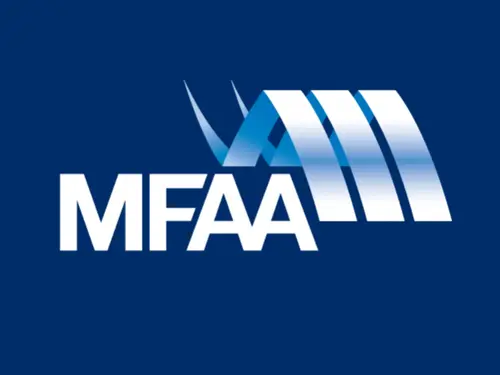

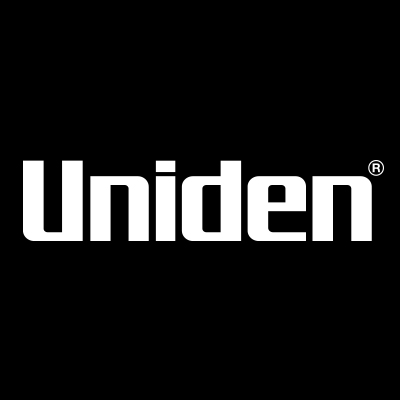

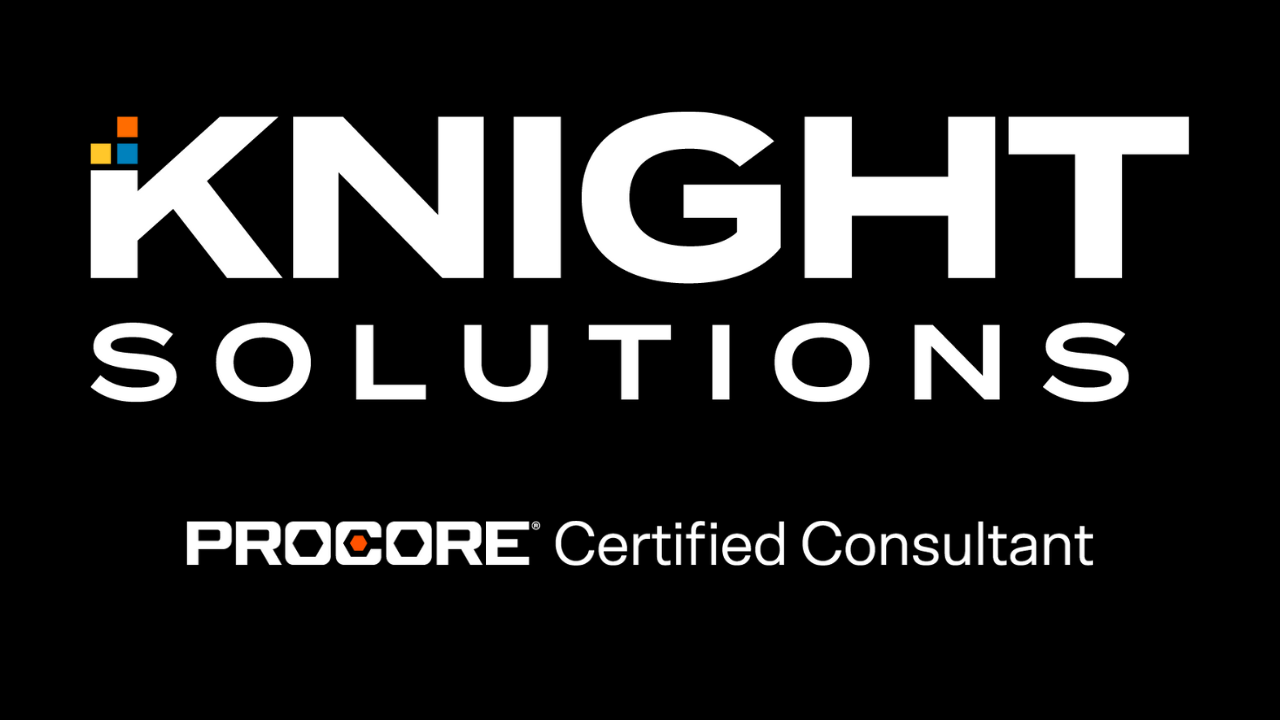




We share our Google Ads knowledge & Digital Marketing expertise
Our value proposition is simple – We provide ideas to our clients for free.
It’s up to them if they want to do it themselves or hire us to do it if they don’t have the time, resources or technical skills This honest approach is what sets us apart from the rest of the marketing agencies who tend to keep their cards close.
You will also get constant strategic counsel and tactical marketing skills from someone who has done this for 12+ years working for SMBs, Large Enterprises, Start-ups and eCommerce companies of all shapes and sizes.
What you get from us:
-
Full support during Australian Business hours -
Wealth of knowledge from industry leading Google Ads experts -
Conversion rate optimisation ideas for your website -
Strategic counsel on all things digital marketing related -
Advice on building integrated marketing plans
Google Ad plans come with:
-
Google Ads account setup and configuration -
Keyword research -
Ad copy writing -
Conversion tracking implementation -
Daily monitoring and optimisation -
Fortnightly meetings -
Monthly or fortnightly reports
Our digital marketing guides & industry updates
Contact us to find out how we
can help your business grow

Frequently asked questions about paid Google Ads
What is Google Ads and how does it work?
Google Ads, previously known as Google AdWords is an advertising platform created by Google. It enables advertisers to showcase their advertisements on Googles search engine results pages (SERPs). These ads appear throughout various parts of the Google Network such as Search results, Display (image ads on other websites) and Shopping Ads which encompasses numerous websites and other online platforms. The primary objective of Google Ads is to support businesses in reaching their intended audience and driving traffic to their websites.
Here’s a brief overview of how Google Ads operates:
Ad Creation;
Advertisers generate text, image or video ads paired with keywords that relate to their products or services. These keywords are the terms that users may employ when conducting searches on Google.
Campaign Setup;
Advertisers organise their ads into campaigns based on objectives, such as promoting a product or generating website traffic.
They establish a budget for each campaign specifying the amount they’re willing to spend on an monthly basis.
Keyword Targeting;
Advertisers keywords associated with their business that they want their ads to be connected with. When users search for these keywords on Google the ads have the potential to appear in the search results.
Bid Strategy;
Advertisers determine bids for their chosen keywords. The bid represents the amount they’re willing to pay for each click, on their advertisement.
The more a bid is increased the greater the chances of the ad being shown prominently.
About Ad Auction;
When a user searches for a keyword Google conducts an auction to determine which ads will be displayed and their order.
The auction takes into account factors such, as the amount of the bid how relevant the ad is and the expected rate at which users will click on it (CTR).
Regarding Ad Placement;
Ads are showcased on the search engine results page (SERP) when users search for keywords. These ads can appear either at the top or at the bottom of the page. They are marked as “Ads.”
Cost Per Click (CPC);
Advertisers are billed based on a cost per click (CPC) model. They only pay when someone actually clicks on their ad not when it is merely displayed.
Quality Score;
Google assigns each ad a Quality Score based on factors like its relevance to users searches, expected click through rate and how well its landing page performs. A higher Quality Score can lead to costs for advertisers and better placement of their ads.
Monitoring Ad Performance;
Advertisers can keep track of how their adsre performing through Google Ads dashboard. They have access to metrics such as clicks, impressions, conversion rates and return, on investment (ROI).
Google Ads offers an adaptable advertising platform that enables businesses to reach their target audience manage expenses and gauge the effectiveness of their campaigns. Advertisers can fine tune their strategies using performance data to improve their advertising endeavors.
What should I ask a Google Ads agency?
When considering hiring a Google Ads agency it’s crucial to ask questions to ensure they are the fit, for your business requirements.
Here are some essential inquiries to pose to a Google Ads agency:
Experience and Expertise;
How long has your agency been managing Google Ads campaigns? Can you showcase any campaigns you’ve handled for businesses to mine?
Certifications:
Are all your team members certified in Google Ads?
Do you hold any other relevant certifications or accreditations?
Client References:
Can you provide references from current or past clients? Have you worked with businesses in my industry before?
Strategy and Planning;
How do you develop a Google Ads strategy for clients?
What steps will you take to thoroughly understand our business and goals?
Target Audience and Keyword Research:
How do you identify and effectively target the most relevant audience for our business? What is your approach when it comes to conducting keyword research?
Ad Copy and Creative;
How do you craft ad copy and creative materials that align with our brand?
Could you share some examples of ad creatives that your team has developed?
Budget Management:
How do you determine a budget, for a Google Ads campaign? What strategies do you employ to optimize budget allocation?
Performance Tracking and Reporting:
Which metrics do you monitor to evaluate performance. How often do you provide reports?
How do you gauge the effectiveness of a campaign. Present the results?
Ad Testing and Optimisation:
What is your approach, to conducting A/B tests and optimising ad campaigns?
Which tools and methodologies do you employ to enhance campaign performance?
Communication and Collaboration:
How frequently will we discuss the campaigns progress and strategy?
What communication method do you. How can we collaborate effectively?
Ad Technology and Tools:
What tools and technologies do you utilize for managing Google Ads campaigns? How do you stay up to date with changes in the Google Ads platform and industry practices?
Contractual Arrangements and Fees:
What is your fee structure? Is it based on a percentage of ad spend, a fixed fee or another model?
Are there any charges we should be aware of?
Client Retention and Satisfaction:
How do you ensure client satisfaction and what measures do you take to maintain long term client relationships?
Can you provide an example where you successfully addressed a challenge or concern, for a client?
These inquiries will assist you in evaluating the agency’s expertise, methodology and suitability for your business objectives. It is essential to select an agency that possesses not the technical skills but also a comprehensive understanding of your industry.
Additionally they should be able to communicate and collaborate seamlessly with your team.
How expensive is Google Ads?
The cost of running Google Ads can vary based on factors. Google Ads functions, on a pay per click model meaning advertisers are billed every time a user clicks on their ad.
Several factors influence the amount you’ll spend on Google Ads:
Competition:
The competitiveness of industries affects bid prices for keywords. For instance finance, insurance and legal services industries have CPCs (Cost Per Click) due to competition.
Keywords:
The specific keywords you choose for your ads play a role in determining the cost. Popular and competitive keywords generally have CPCs while long tail keywords might be more affordable.
Geographic Targeting:
Targeting locations can impact costs. Advertisers targeting cities or regions with competition might face higher CPCs.
Ad Quality and Relevance:
Google assesses the quality and relevance of your ads through a Quality Score metric. High quality ads with content and a positive user experience often lead to CPCs.
Ad Position:
The position of your ads on the search results page affects costs. Ads appearing at the top usually have CPCs compared to those, at the bottom.
Ad Extensions and Formats:
Utilising ad extensions and different ad formats can impact costs. The extensions and formats that enhance the user experience may positively influence the Quality Score. Potentially reduce the cost, per click (CPC).
Bidding Strategy:
Your bidding strategy, whether its manual or automated can have an effect on costs. Automated bidding strategies have the capability to adjust bids in time based on factors.
Budget:
The daily or monthly budget you allocate to your campaigns determines how much you are willing to spend. Making adjustments to your budget can affect the number of clicks and impressions your ads receive.
It’s important to remember that while Google Ads can be a cost measurable advertising channel it requires management and optimisation to ensure efficient allocation of your budget and achieve a positive return on investment (ROI).
The actual costs may vary significantly depending on your circumstances.
Flow Digital advises to start with an understanding of your business objectives conduct keyword research and consistently monitor and refine your campaigns, for optimal performance.
How long does it take to get results on Google Ads?
The time it takes to start seeing outcomes from Google Ads can vary depending on factors, such, as your industry, competition, budget and the effectiveness of your advertising campaigns. Here are some important points to consider;
Ad Approval Time:
Once you create and launch your ad campaign Google usually. Approves your ads quickly. However in some cases this process may take a bit longer.
Initial Data Collection:
In the stages of your campaign Google needs time to gather data on how users engaging with your ads. This includes information about click through rates (CTR) conversion rates and other essential metrics.
Optimisation Period:
To achieve results you will likely need to optimise your campaign. This involves making adjustments to keywords ad copy targeting settings and bidding strategy based on the performance data you collect.
Improving Quality Score:
Enhancing your Quality Score can have an impact, on the position and cost effectiveness of your ads. Factors influencing Quality Score include ad relevance, expected click through rate (CTR) and landing page experience.
However building a Quality Score may require some patience. The amount you allocate to your campaigns and the level of competition, in your industry can have an impact on how you see results. While higher budgets and competitive industries may lead to outcomes they also come with higher costs.
The time it takes for users to go from clicking on your ad to completing a desired action (such as making a purchase or filling out a form) can vary. Certain industries have conversion cycles, which means results may take longer to materialise.
When testing ad creatives targeting options and bidding strategies it’s important to allow for a testing period that collects data and determines what works best for your specific goals.
As a recommendation it is advised to give your Google Ads campaigns several weeks to a few months before expecting significant results. However ongoing monitoring and optimisation are key for long term success.
Regularly review campaign performance adjust strategies based on insights gained and continuously refine approaches in order to achieve the outcomes over time. It’s worth noting that the nature of your business and campaign objectives can also influence the timeline, for achievements.
Should I Do Paid Google Ads and SEO at the same time?
Absolutely, it can be advantageous to integrate both paid Google Ads and SEO (Search Engine Optimisation) into your marketing plan. Each approach offers benefits. and contributes to different aspects of your online presence and marketing.
Here are some reasons why its worth considering running paid Google Ads while also investing in SEO;
Enhanced Online Visibility:
By combining paid advertising with search efforts you can ensure that your brand appears in both paid and search results. This broadens your visibility, on the search engine results page (SERP) increasing the chances of attracting clicks and visitors.
Swift Results with Paid Ads:
Paid advertising platforms like Google Ads can yield quantifiable outcomes. If you’re seeking to generate traffic and leads promptly utilising paid ads can be a tool while waiting for your SEO endeavors to gain traction.
Long Term Organic Growth through SEO:
SEO is a long term strategy that revolves around optimizing your websites ranking in search results. Although it may take time to witness the benefits the outcomes tend to be more sustainable and cost effective over the run.
Diversified Traffic Sources:
Relying solely on traffic leaves your business susceptible to fluctuations resulting from changes in search engine algorithms.
In summary incorporating both paid Google Ads and SEO into your marketing approach offers online visibility quick results through paid ads, long term organic growth via SEO efforts, as well as diversified traffic sources, for enhanced stability.
Paid advertising offers a level of control and diversity ensuring that you can still attract visitors even if there are changes, in rankings.
Targeting Different Stages of the Sales Funnel:
Paid ads and organic search results have the ability to target users at stages of the buyers journey. Paid ads work well for capturing users during the awareness and consideration stages while organic search results tend to attract users in the consideration and decision stages.
Data and Insights:
Both paid advertising and SEO provide data and insights. Analyzing the performance of your paid campaigns can inform your SEO strategy and vice versa leading to a data driven marketing approach.
Maximising Keyword Coverage:
While your SEO efforts focus on optimising your website for keywords paid ads can help broaden your coverage to include a range of keywords, including highly competitive ones. This allows you to experiment with messaging strategies.
Remarketing Opportunities:
Paid advertising platforms like Google Ads provide opportunities for remarketing campaigns. These campaigns allow you to target users who have previously visited your website but did not convert, giving you a chance to bring them back and encourage engagement.
It is crucial to coordinate your paid and organic strategies in order to maintain consistency, in messaging, branding and user experience across all channels.
By combining both paid and methods you can develop a digital marketing strategy that enhances your online presence and achieves success, in multiple business goals.
What is the difference between Google Ads and SEO?
Google Ads, formerly known as Google AdWords and SEO (Search Engine Optimisation) are two complementary methods to enhance the visibility of a website, on search engine results pages (SERPs). Here are the main contrasts between Google Ads and SEO.
Paid vs. Organic:
Google Ads; This is a paid advertising platform where advertisers bid on keywords to have their ads displayed at the top or bottom of search results when users enter those keywords. Advertisers pay for each click on their ads.
SEO:
This is a strategy that involves optimising your website and its content to improve its visibility in unpaid (organic) search results. The goal of SEO efforts is to rank in search engine algorithms based on relevance, authority and user experience. it also includes building rich organic links from other websites, which can be achieved by creating business directories, social media profiles and posts and producing high value content such as blogs that other websites might cite as a source when producing their own content
Google Ads – Cost
This channel has costs as advertisers pay for each click on their ads. The costs depend on factors such, as keyword competitiveness bid amounts and the effectiveness of the ad campaign.
SEO – Costs
It has costs related to the time and resources invested in optimising the website. While the traffic generated through SEO is technically “free ” ongoing resources may be required for maintaining optimization efforts.
Speed of Results;
Google Ads offers immediate results.
Once a campaign is established advertisements can begin appearing on the Search Engine Results Pages (SERPs) generating traffic instantly.
Search Engine Optimization (SEO) takes time to yield results. It may require weeks or even months for SEO efforts to impact search rankings and drive traffic.
Visibility on the SERP:
Google Ads display ads at the top or bottom of search results marked as “Ad.” They are prominently. Can effectively capture attention.
Organic search results in SEO appear below the ads. Although they may not have the level of prominence users often place trust in organic results as they perceive them as earned rather than paid for.
In terms of control and flexibility.
Google Ads provide advertisers with a level of control over ad targeting, budget management and ad copy. Advertisers can easily adjust settings and budgets to optimise their campaigns.
SEO involves control over the placement of organic results. Rankings are influenced by factors. Any changes may take time to be reflected.
When considering long term, versus short term strategies, Google Ads are generally considered a short term strategy since they deliver results but require ongoing investment to maintain visibility. On the hand SEO is more of a long term strategy that focuses on growth and establishing a strong online presence.
Though it may take some time to witness the outcomes the advantages can endure in the run through effort and optimization.
User Perception;
Some users may recognise these as paid advertisements. However if the ad is relevant and well targeted users might not have an issue and would still click on it.
Users often perceive results, as reliable and authoritative since they are earned through relevance and quality.
In conclusion while Google Ads and SEO follow approaches, with their advantages integrating both into your digital marketing strategy can provide a comprehensive and effective approach to boost online visibility and accomplish your business objectives.
Can I setup and run Google Ads myself without an agency?
You certainly can set up and manage Google Ads campaigns on your own without the need, for hiring an agency. However, results may not be as good without hiring a professional who knows how to optimise for best results.
Google Ads is designed to be user friendly allowing businesses, medium sized enterprises to successfully handle their own campaigns. Here’s a step by step guide to help you begin;
Creating a Google Ads Account;
If you don’t already have one you can easily create a Google Ads account by visiting the Google Ads website and following their sign up process.
Campaign Planning:
Clearly define your campaign objectives, such as increasing website traffic, generating leads or driving sales. Determine your target audience. Establish a budget for your campaigns.
Keyword Research:
Conduct keyword research to identify keywords that align with your products or services. Tools like Google Keyword Planner can assist you in finding keywords with search volume and relevance to your business.
Campaign Setup:
Set up your campaign within the Google Ads platform. Choose the campaign type that best suits your objectives (Search, Display, Video, Shopping) and carefully follow the step, by step setup process.
Ad Groups and Keywords:
Organise your campaign into ad groups, each focusing on a theme or set of keywords.
For each ad group it’s important to create ad copy that resonates with your audience and choose the keywords. Your ads should be compelling. Clearly convey your message enticing users to click. Don’t forget to leverage ad extensions to provide information and increase the visibility of your ads.
When it comes to bid strategy consider your campaign objectives. Google Ads offers bidding options, like CPC (Cost Per Click) automated bidding and target CPA (Cost Per Acquisition). Select the strategy that aligns best with your goals.
To enhance your ads further make use of ad extensions such as site links, callouts and structured snippets. These extensions can provide information. Make your ads more relevant and visible.
It’s essential to set up conversion tracking so you can measure the success of your campaigns accurately. Define what actions you consider as conversions whether it’s form submissions or product purchases.
Keep an eye on the performance of your campaigns through the Google Ads dashboard. Regular monitoring allows you to make adjustments in bids refine ad copy and test creatives for optimization over time.
Remember that Quality Score plays a role in how your ads perform. Factors like ad relevance expected click through rate and landing page experience influence this score. Ensure that your landing pages offer an user experience, for results.
Managing Your Budget:
Make sure to monitor your budget and make adjustments based on how your campaigns and keywords are performing. If you notice that certain campaigns or keywords are bringing in results consider allocating more of your budget to them.
Staying Updated and Adapting:
Stay informed, about any changes happening on the Google Ads platform as industry best practices. It’s important to adapt your strategies based on the performance data you gather and continue optimising your campaigns.
While it is possible to handle Google Ads campaigns independently it’s crucial to remember that successful advertising requires attention and optimisation. If you have the time and resources to learn and manage your campaigns yourself it can be a cost option. However if you find it challenging or if your campaigns become more complex, over time you might want to consider seeking assistance or making use of the support resources provided by Google.
Why do my ads not show up when I search for my keywords?
If your advertisements are not appearing when you search for your chosen keywords there could be factors contributing to this issue.
Here are some common reasons and steps you can take to troubleshoot:
Approval Status of Ads:
Verify the status of your ads to ensure they have been approved. If your ads violate Googles advertising policies they may be. Awaiting review.
Budget Constraints:
Make sure that your campaigns daily budget has not been exhausted. If your daily budget limit is reached your ads may not be displayed until the following day.
Bid Amount:
check the bid amounts for the keywords you are targeting. If your bids are too low it might make it challenging for your ads to compete and appear on the page of search results.
Keyword Match Types:
Confirm that you have appropriately set up keyword match types. If you have chosen phrase match types for your keywords it’s possible that they may not trigger ads for every variation of a search query.
Geographic Targeting:
Ensure that your ads are targeted correctly based on locations. If your targeting is too narrow it’s possible that users, outside the specified regions may not see your ads.
Ad Scheduling:
Confirm that your ad scheduling settings align with peak activity times, for your target audience. This will help ensure that your ads run during periods when potential customers are most active.
These steps should assist in troubleshooting why your ads might not be displaying when searching for keywords.
Ad Placement:
The position of your ads is determined by something called Ad Rank. Ad Rank takes into account factors like your bid, the quality of your ad and the expected click through rate (CTR). To improve your Quality Score try creating ad copy and enhancing the experience, on your landing page.
Keywords with Low Search Volume:
If you notice that your keywords have a search volume it means that your ads may not be triggered frequently. Consider expanding your list of keywords or refining your targeting to reach an audience.
Enhancing Ads with Extensions:
An effective way to make your ads more visible is by using ad extensions. These extensions provide information. Can greatly enhance the relevance of your ads.
Targeting Specific Devices:
Take a look at your device targeting settings. If you’ve set up restrictions for displaying ads on devices it’s possible that they won’t appear on others. Review these settings to ensure visibility across all devices.
Avoiding Negative Keywords:
Make sure you don’t have any keywords that could be blocking the display of your ads for search queries. Double check this to ensure that potential customers are able to see all ads.
Keeping an Eye on Competition:
It’s important to monitor the landscape within your industry. If competitors are aggressively bidding on the keywords as you it might become challenging to secure a position, for your ads. Stay informed. Adjust accordingly.
Using Googles Ad Preview Tool:
To get an idea of how specific queries will display without impacting ad performance utilize Googles Ad Preview and Diagnosis tool. This tool allows you to preview how different queries will affect ad appearance before making any changes.
Make sure that your Google Ads account is not suspended or in violation of any policies. If you violate Googles policies your ads may be. Your account may be suspended. In case you have already checked these factors and your ads are still not appearing it would be beneficial to review the guidelines provided by Google and reach out to their support team, for assistance. Additionally consider reviewing your campaign settings, ad group structure and targeting options to ensure they are aligned with your advertising objectives.

